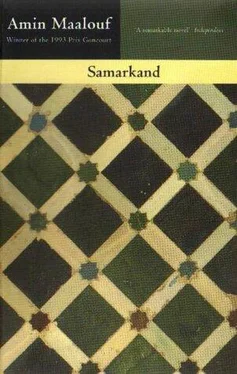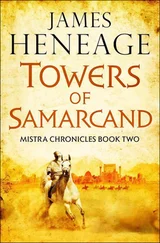‘How do you know what the Sultan might have said to Jamaladin in private?’
‘Sayyid Jamaladin himself told me. He trusted me and hid nothing from me. When I was in Constantinople he treated me like his own son.’
‘If you were so well treated there why did you come back to Persia where you feared being arrested and tortured?’
‘I am one of those who believe that no leaf falls from a tree unless that has been planned and inscribed, since the beginning of time, in the Book of Destiny. It was written that I would come to Persia and would be the tool for the act which has just been carried out.’
If those men who strolled about on Yildiz Hill, all around Jamaladin’s house, had written on their fezzes ‘Sultan’s spy’, they would not have given away any more than what the most artless of visitors took in at first glance. Perhaps, however, that was their real purpose in being there: to discourage visitors. In fact, the residence, which usually swarmed with disciples, foreign correspondents and various personages who were in town, was totally deserted on that close September day. Only the servant was there, as discreet as ever. He led me to the first floor where the Master was to be found, pensive and distant and slumped deep in a cretonne and velvet armchair.
When he saw me arrive his face lit up. He came toward me with great strides and held me to him, apologizing for the trouble he had caused and saying that he was happy that I had been able to extricate myself. I described to him my escape in the smallest detail, and how the Princess had intervened, before returning to tell him of my too brief meeting with Fazel and then with Mirza Reza. The very mention of the latter’s name irritated Jamaladin.
‘I have just been informed that he was hanged last month. May God forgive him! Naturally he knew what his fate would be and could only have been surprised by the length of time it took to execute him — more than a hundred days after the Shah’s death! Doubtless they tortured him to extract a confession.’
Jamaladin spoke slowly. He seemed to have grown weak and thin; his face which was usually so serene was beset with twitches which at times disfigured him without detracting from his magnetism. One had the impression that he was suffering, particularly when he spoke of Mirza Reza.
‘I can hardly believe it of that poor boy, whom I had looked after there in Constantinople, whose hand never stopped shaking and who seemed incapable of holding a cup of tea — that he could hold a pistol and fell the Shah with one shot. Do you not think that they might be exploiting his unbalanced mind to pin someone else’s crime on him?’
I replied by handing him the cross-examination which the Princess had copied out. He put on a slim pair of pince-nez and read and re-read it with fervour, or was it terror, or, it seemed to me from time to time, a sort of inner joy. Then he folded it up, slipped it into his pocket and proceeded to pace up and down the room. There were ten minutes of silence before he uttered this curious prayer:
‘Mirza Reza, lost child of Persia! Would that you had simply been mad, would that you had just been wise! If only you had been content to betray me or to remain faithful to me, to inspire tenderness or revulsion! How can we love or hate you? And God Himself, what will He do with you? Will He raise you up to the victims’ Paradise or relegate you to hangman’s hell?’
He came and sat down again, exhausted, with his face buried in his hands. I remained silent, and even made myself breathe more quietly. Jamaladin sat up. His voice seemed calmer and his mood more lucid.
‘The words I read are indeed Mirza Reza’s. Until now I still had my doubts, but I do not any more. He is definitely the assassin. He probably thought he was acting to avenge me. Perhaps he thought he was obeying me. However, contrary to what he believes, I never gave him an order to murder. When he came to Constantinople to tell me how he had been tortured by the Shah’s son and his cohorts his tears were flowing. Wanting to shake him out of it, I told him: “Now stop whining! People will say that you just want them to feel sorry for you, that you would even mutilate yourself so that they will feel sorry for you!” I told him an old legend: when the armies of Darius confronted those of Alexander the Great, the Greek’s counsellors brought to his attention that the troups of the Persians were much more numerous than his. Alexander kept his poise and shrugged. “My men,” he said, “fight to win. The men of Darius fight to die!”’
Jamaladin seemed to be racking his memory.
‘That is when I told Mirza Reza: “If the Shah’s son is persecuting you, destroy him, instead of destroying yourself!” Was that really a call to murder? Do you, who know Mirza Reza, really think that I could have entrusted such a mission to a madman whom a thousand people may have met here in this very house?’
I wanted to be honest.
‘You are not capable of the crime they are attributing to you, but your moral responsibility cannot be denied.’
He was touched by my frankness.
‘That I admit. Just as I admit that daily I wished that the Shah would die. But what use is it for me to defend myself. I am a condemned man.’
He went over to a small chest and took out a sheet with some fine calligraphy on it.
‘This morning I wrote my will.’
He placed the text in my hands and I read it with emotion:
‘I do not suffer from being kept prisoner. I have no fear of death being near. My only source of sorrow is having to state that I have not seen blossom the seeds I have sown. Tyranny continues to oppress the peoples of the Orient and obscurantism still stifles their freedom cry. Perhaps I would have been more successful if I had planted my seeds in the fertile soil of the people rather than in the arid soil of royal courts. And you, people of Persia, in whom I placed my greatest hopes, do not think that by eliminating a man you can win your freedom. It is the weight of secular tradition that you must dare to shake.’
‘Keep a copy of it and translate it for Henri Rochefort. L’lntransigeant is the only newspaper which still holds me innocent. The others treat me as an assassin. The whole world wants my death. Let them be reassured — I have cancer. Cancer of the jaw.’
As with every time that his resolve weakened and he complained, he tried to make up for it on the spot by giving a forced laugh of unconcern and making a learned jest.
‘Cancer, cancer, cancer,’ he repeated as if in warning. ‘In the past doctors attributed illnesses to the conjunctions of the stars, but only cancer has kept its astrological name, in all languages. The fear is still there.’
He remained pensive and melancholy for a few moments, but then hurried to carry on, in a happier vein which was blatantly affected but, for all that, more poignant.
‘I curse this cancer. Yet nothing says that it is the cancer which will kill me. The Shah is demanding my extradition: the Sultan cannot hand me over since I am still his guest, but be cannot let a regicide go unpunished. He has hated the Shah and his dynasty to no avail, plotted against him every day, but members of the brother-hood of the great of this world bolster each other against an intruder like Jamaladin. What is the solution? The Sultan will have me kill myself, and the new Shah will be comforted, since, in spite of his repeated requests for my extradition, he has no wish to stain his hands with my blood at the outset of his reign. Who will kill me? The cancer? The Shah? The Sultan? Perhaps I will never have the time to know. But you, my friend, you will know.’
He then had the gall to laugh!
In fact I never knew. The circumstances surrounding the death of the great reformer of the Orient remained a mystery. I heard the news a few months after my return to Annapolis. A notice in the 12 March 1897 edition of l’Intransigeant informed me of his death three days earlier. It was only towards the end of the summer, when the promised letter from Shireen arrived, that I heard the version of Jamaladin’s death which was current among his disciples. ‘For some months he had been suffering from raging tooth-ache,’ she wrote, ‘no doubt caused by his cancer. That day, as the pain had become unbearable, he sent his servant to the Sultan who sent over his own dentist who listened to Jamaladin’s chest, unwrapped a syringe which he had already prepared and gave him an injection in the gums while explaining that the pain would soon die down. Hardly a few seconds passed before the Master’s jaw swelled up. Seeing him suffocating, the servant ran off to bring back the dentist, who had not yet left the house, but instead of coming back the man started to run as fast as he could towards the carriage which was waiting for him. Sayyid Jamaladin died a few minutes later. In the evening, agents of the Sultan came to take away his body, which was hurriedly washed and buried.’ The princess’s account finished, without any transition, by quoting words from Khayyam which she had carefully translated: ‘Those who have amassed so much information, who have guided us towards knowledge, are they themselves not swamped by doubt? They tell a story and then go to bed.’
Читать дальше












